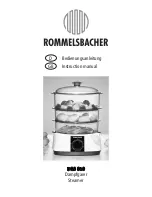
P/3
P/4
High Temperature Warning
If the cooker is operating with out water or moisture, pressure will not be built up in
the pot. Over heating become the most likely outcome. Excessive temperature
may also build up due to situations such as, missing inner pot, inner pot not proper
contact with heating element. Or inner pot having heat dissipation problem (e.g.
burnt starch at the bottom of the inner pot blocking heat dissipation). Under such
conditions, electric pressure cooker will stop heating when the temperature is
over a certain limit and sound alarm.
Extreme Power Protection
Electric pressure cooker is equipped with a special fuse which disconnects power
at excessively high temperature, i, e.169
°
C-172
°
C, and extremely high electrical
current. A extremely high electrical current drawn by the cooker indicates and
unsafe situation.
Pressure Regulator Protection & Excess Pressure protection
If the pressure exceeds 200kPa, the steam release (comparable to the pressure
regulator in stove-top pressure cooker) will be pushed up to allow the steam being
released to bring down the pressure inside the pot.
If the pressure becomes too high and pressure regulator protection
malfunctioned, electric pressure cooker's internal protection mechanism will
activate, shifting the inner pot downwards to create a gap between the lid and the
inner pot. Steam will be released from the gap into the internal chamber and
heating stopped.
Anti-skidding feet
To prevent the body from moving when working.
Lid Close Detection
If the lid is missing or not closed properly, electric pressure cooker will not activate
pressurized cooking. Only the keep-warm function works to allow warning
stockpot while serving.
Extreme temperature protection
If the temperature inside is more than the limited temperature, all of the
protection equipment will out of order and the electric pressure cooker shut off
automatically.
PARTS AND FEATURES
1.
Handle
2.
Cover
3.
Pressure limit valve
4.
Float valve
5.
Anti-block shield
6.
Cover fixed nut
7.
Rubber ring
8.
Inner pot
9.
Middle layer
10.
Middle ring
11.
Shell
12.
Bottom Plate
13.
Control manual
14.
Condensation collector
15.
Socket
www.vitesse.ru

































